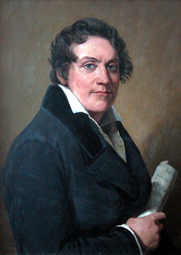THE CRUSELL SCHOLARSHIP
The scholarship was inaugurated in 1987 by the society of Music in Linköping (MIL) and is awarded to promising young Swedish conductors, a category which has hitherto been neglected in the scholarship field. The scholarship is one of few in Sweden intended solely for conductors. Its purpose is to promote the musical and artistic development of the scholarship holder. It cannot be applied for and is awarded every second year.
The name of this scholarship was chosen in order to honour the memory of composer/conductor/soloist Bernhard Crusell and his special connection with Linköping.
The scholarship holder
is elected by a committee whose chairman is Nils Spangenberg, stage director. Other members are Herbert Blomstedt, professor; B Tommy Andersson, professor; Stig Jacobsson, music editor for Norrköping Symphony Orchestra; Sven-David Sandström, composer/professor; and Tomas Herrgårdh, head of Östgöta Symphonic Winds, the professional Wind Orchestra in Linköping (the same orchestra Crusell himself directed). The musical advisers of the committee are Håkan Hagegård, court singer by special appointment to the King, and Arnold Östman, Ph.D h.c.
The next laureate will be announced during a festive concert with the Östgöta Symphonic Winds in the Linköping Concert Hall on October 22, 2015.
Holders of the Crusell scholarship:
1989 Per Borin 1991 Mats Janhagen 1993 B Tommy Andersson 1995 Michael Bartosch 1997 Andreas Hanson 1999 Stefan Solyom 2001 Joakim Unander |
2003 Andreas Lönnqvist 2005 Eva-Charlotte Roslin 2007 Olof Boman 2009 Daniel Blendulf 2011 Marie Rosenmir
2013 Johan Larsson |
The ambition of MIL is to increase the amount of scholarship money awarded in future. You can assist us in this by making a contribution to:
The Foundation of MIL-fund, Crusellstipendiet, Plusgiro Account No 435 99 07-5.
The Barbro Osher Pro Suecia Foundation was the main sponsor of the Crusell Scholarship in 2009.

Who was Crusell?
Bernhard Henrik Crusell (1775-1838) was a Finno-Swedish composer and one the foremost representatives of early Swedish romantic music. Between 1793 and 1834 he worked as a clarinetist at the Royal Opera-House Orchestra in Stockholm and was regarded as a virtuoso.
As a clarinetist he received great acclaim in all of Europe. He was offered, among other things, a position as first clarinetist at the Italian Opera in Paris but was forced to decline as he was not granted leave from his position at the Royal Opera-House Orchestra.
It was natural for Bernhard Crusell, the composer, to devote himself to his main instrument, the clarinet. His production in this area comprises chamber music and three clarinet concertos, often performed even by foreign symphony orchestras. He wrote three quartets for clarinet and strings, chamber music for wind instruments and music for the play The Little Slave Girl. In his later production one should also note the music for Tegnér’s The Story of Fritiof. Crusell translated several operatic texts. One famous example is Voi che sapete che cosa è amor from The Marriage of Figaro.
Bernhard Crusell had a special connection with Linköping. In 1818 he was hired as conductor of the music bands of Linköping’s two Life Grenadier Regiments, a position that was concentrated to the summer months, when The Royal Opera House in Stockholm was closed for vacation and the musicians were not paid a salary. The job in Linköping was one that Bernhard Crusell had for 18 years.
During that time Crusell managed to make his mark on the musical life of Linköping. One annual and highly esteemed event was the series of charity concerts which were held in St. Lars Church under his direction. From these proceeds a fund was created in 1826, nowadays known as the Crusell Foundation. Bernhard Crusell also wrote a cantata for the opening of the Göta Canal in 1832.